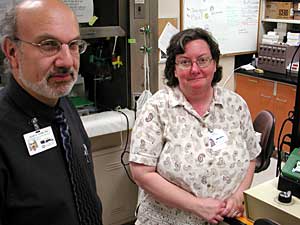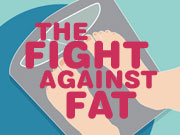|
Audio
Photos
Resources
Respond to this story
|
Obesity and the brain
June 2, 2003
 |
| Dr. Allen Levine and his assistant, Martha Grace, in their lab at the Veterans' Affairs Hospital in Minneapolis. They are researching the effects of sugar and other substances on rat brains. (MPR Photo/Rob Schmitz) |
Rochester, Minn. — We all have our first memories. Some of Peter Amstutz's first memories revolve around food. Fast food. "I remember the Hamburglar commercials and Mayor McCheese, and I remember thinking what a great loss it was that we didn't have a McDonald's in our town," says Amstutz. "We were so backwards that we didn't even have a McDonald's."
When McDonald's finally came to Peter's hometown of Minot, North Dakota, it was a big event for him. He was soon a regular.
For as long as he can remember, Peter has had a weakness for fast food. Over his adolescent years, this weakness turned into what he calls an addiction. It's become a lifelong battle with obesity.
Although using the word addiction to describe his relationship with food might be seen as an exaggeration, recent discoveries in neuroscience have led experts to believe it's not as far-fetched as some may think.
Dr. Allen Levine and an assistant, Martha Grace, are operating a vibratome in a research laboratory at the Veterans' Affairs Hospital in Minneapolis. It's a machine they use to slice rat brains. They're analyzing rat brain sections to find out more about the nature of endogenous opioids, a class of neurotransmitters formerly known as endorphines.
|
I promised myself I was going to lose weight. I would start out maybe by bicycling and eating less, and as the day went on, I would blow it. I would start eating and would just decide, 'Well, that's it for today, I'll work on it again tomorrow.'
- Peter Amstutz |
Their research has identified endogenous opioids as one of the neurotransmitters that trigger the human pleasure response after eating sweet foods. Levine's studies on rats have revealed that humans aren't alone in going out of their way to get sugar.
"You can give rats Oreo cookies, and they'll always rip off the cookie and lick the inside," Levine says with a smile. "Humans aren't the only animal that licks the inside of an Oreo cookie."
Levine is looking for the parts of the brain that create a craving for sugar. Having done that, he then looks for ways to try and curb this craving. He says the pharmaceutical industry is very interested in his work, because it wants to develop drugs to treat people who overeat.
People like Peter Amstutz.
When Amstutz was 16, he was overweight and beginning to feel depressed. But he developed a passion which he hoped would help him escape. He turned to flying.
"The big thing about flying for me is I left the world behind," says Amstutz. "When I was in the air, I didn't worry about food. I didn't feel bad. When you're so focused on what you're doing, all my problems were left behind."
After getting his pilot's license, Amstutz enrolled in the flying program at the University of North Dakota. He was one of the program's best students. The university rewarded him with a position as a flying instructor.
But there was a problem. By 1986, he weighed almost 300 pounds, too much to safely ride in a two-seater airplane with a student.
"I promised myself I was going to lose weight. I would start out maybe by bicycling and eating less, and as the day went on, I would blow it. I would start eating and would just decide, 'Well, that's it for today, I'll work on it again tomorrow,'" says Amstutz.
|
You can give rats Oreo cookies, and they'll always rip off the cookie and lick the inside.
- Dr. Allen Levine |
This cycle continued. He tried numerous diets, but they all failed, usually after a trip to a fast food restaurant. At one point, he was so desparate he made up his own diet. He called it the McDonald's Diet -- two hamburgers and a soda for breakfast, no lunch, and two more hamburgers and a soda for dinner.
That diet failed, too.
Back in a Minneapolis laboratory, Dr. Levine is going over test results with his assistant. Levine has identified one part of the brain stimulated by sugar. He says it's the same part stimulated when drug addicts take their drug of choice. For this reason, Levine says when it comes to obesity, sugar is a leading culprit.
"You're built as a machine to ingest food and ingest palatable foods," says Levine. "It's going to take some work to stop that when the food is freely available."
Levine says the answer is as obvious as more exercise and eating healthier food. But these days, sugar is hard to escape.
According to the USDA, Americans' calorie consumption has grown steadily, along with the average weight of an American. Since the 1950s, Americans' calorie consumption increased by 27 percent, and their sugar intake increased by almost 40 percent during the same time.
In 1986, Peter Amstutz realized that obesity wasn't his only problem. He was depressed, and began to see a therapist.
"My whole self-esteem was wrapped up in being a pilot. If I wasn't going to be an airline pilot, there was no point in living anymore," says Amstutz. "(My therapist) said, 'You're worth more than your job.' I looked at him like, 'You're crazy!'"
Eventually, Amstutz started taking anti-depressants. The drugs helped him curb suicidal urges. But there was a major downside -- you can't legally fly a plane if you're taking anti-depressants.
According to Harvard Medical School's Consumer Health Information, as many as two-thirds of all obese people are what they call carbohydrate cravers, people who constantly crave sweet foods. Obese carbohydrate cravers often score high on tests for depression.
Researchers have found that eating carbohydrates raises levels of the amino acid tryptophan in the bloodstream. The brain converts tryptophan into serotonin. Serotonin is a brain chemical regulating mood and sleepiness. Carbohydrate cravers are thought to have a faulty serotonin feedback mechanism. As a result, their bodies never stop craving carbohydrates.
Research has shown that serotonin imbalances can also trigger depression. According to Allen Levine, it's too early to tell what role sugar plays in a potential link between obesity and depression.
"Whether or not obesity contributes to depression, there are some new data suggesting that may be the case. But the problem is, depression is not a clean thing," says Levine. "If people are on drugs, the drugs can then affect whether you're eating more or less, so you got a real problem. Is it the drugs that are causing it, or the depression causing it? Is obesity causing depression?"
Levine hopes his findings will help answer these questions.
Peter Amstutz says giving up flying was the hardest thing he's ever had to do. Since he made that decision, he's married, moved to Rochester, and now has two children. He's still depressed and he still feels addicted to food.
He says he feels trapped. He yearns to be able to fly again, but if he stops taking anti-depressants, it could be dangerous.
"You're always learning and changing. The addiction itself is changing as time goes by. It's trying to adapt to me, and I'm trying to adapt to it. And we're dancing and trying to figure it out. It's like two parts of you are fighting," says Amstutz.
To explain what he means, Peter turns on his CD player. It's the Bruce Springsteen song Two Faces. Amstutz listens to this song when depression starts to get the most of him.
Two weeks after this interview, Peter called to say he was just released from the hospital. He admitted himself for depression and received a different type of treatment. He was off anti-depressants, and he said he was happy. He said he was eating "like a normal person."
But most importantly, he had called a local airport. He said he was going to fly again.
It's a hopeful sign, but it's hard to tell if this will be a lasting change. Such is the complexity of the brain -- it's hard to understand.
Dr. Alan Levine has a favorite quote he uses to sum up his work on the brain. It's from philosopher Emerson Pugh.
"If the human mind was simple enough to understand, we'd be too simple to understand it."
A portion of this story was rewritten on April 11, 2005.
|
News Headlines
|
Related Subjects
|

